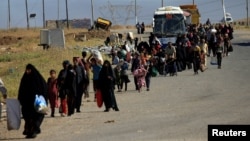Islamic State territory in Mosul shrinks, but heavy fighting looms in old city
| Publisher | Radio Free Europe/Radio Liberty |
| Publication Date | 20 May 2017 |
| Cite as | Radio Free Europe/Radio Liberty, Islamic State territory in Mosul shrinks, but heavy fighting looms in old city, 20 May 2017, available at: https://www.refworld.org/docid/59818d8da.html [accessed 30 May 2023] |
| Disclaimer | This is not a UNHCR publication. UNHCR is not responsible for, nor does it necessarily endorse, its content. Any views expressed are solely those of the author or publisher and do not necessarily reflect those of UNHCR, the United Nations or its Member States. |
May 20, 2017 23:28 GMT
By RFE/RL
 Displaced people flee fighting in Mosul.
Displaced people flee fighting in Mosul.
Iraqi military officials say the territory controlled by Islamic State (IS) militants in western Mosul has been reduced to 8 square kilometers, but the area includes the Old City, where the heaviest fighting of the campaign is likely still to come.
Iraqi special forces on May 20 said their troops had taken the area assigned to them but added they were ready "to support any other forces if we are ordered to by the prime minister."
Local reports say the militant group is now clinging to three neighborhoods – Al-Shafaa, Al-Zinjiji, and the Old City. The districts are aligned along the western bank of the Tigris River.
The current offensive is aimed at capturing the densely populated and narrow Old City, where an estimated 500 IS fighters are believed to be holding out and using civilians as human shields.
The Old City houses the mosque where IS leader Abu Bakr al-Baghdadi declared his so-called caliphate in 2014.
Speaking at the World Economic Forum's regional gathering in Jordan on May 20, Iraqi President Fuad Masum said he hoped Mosul would be fully liberated "in the next few days."
Iraqi forces backed by U.S. and coalition air support in October began the battle to liberate Mosul, the last major stronghold of the IS extremists in Iraq.
The eastern half was retaken earlier this year, and troops are facing fierce IS resistance in more heavily populated western Mosul.
IS fighters captured Mosul in 2014 as they gained wide swathes of territory in Iraq and Syria in battles against government troops.
However, U.S.-led coalition forces have made major gains against the group, both in Mosul and in the Syrian city of Raqqa, the last major IS stronghold in that country.
The United Nations on May 18 said that up to 200,000 more people could flee Mosul as fighting in the city intensifies.
"The numbers of people who are moving are now so large, it's becoming more and more difficult to ensure civilians receive the assistance and protection they need," UN humanitarian coordinator Lise Grande said.
And despite the government forces' gains in Mosul, two deadly bomb attacks claimed by IS in other parts of Iraq killed at least 27 people.
Near the oil-rich city of Basra, a suicide bombing at a checkpoint killed at least eight people – five civilians and three soldiers – and wounded 41 others on May 19, the local military commander said.
IS claimed responsibility for the attack in an online statement, saying it targeted Shi'ites.
The militant group also claimed responsibility for the double suicide bombings in the capital, Baghdad, that killed at least 19 people and injured 33.
With reporting by AP, dpa, Al-Masdar Al-'Arabi and The Independent
Link to original story on RFE/RL website
